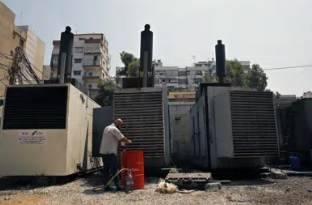2023,Mar,13 사업 Edit Center 시청자수 1063763

BEIRUT Since the collapse of Lebanon’s state power grid, many middle and working class families have been forced to spend most of their monthly income to pay shady neighborhood businessmen running private generators.
Still, they go without electricity for nearly half the day, according to a report by Human Rights Watch released Thursday. The situation threatens to deepen the poverty of this tiny Mediterranean country embroiled in a devastating economic meltdown.
In the report, the New York-based watchdog documented the struggles of over 1,200 lower-income households in Lebanon
Pushed to the bring of bankruptcy, the state-run power company now provides the Lebanese with less than three hours of power a day. Most families told HRW they compromise on food, education, medications and other basic needs to pay for supplemental electricity.
According to the report, generator bills take up about 44% of the average family’s monthly income, and twice that for the country’s poorer families. HRW cited as median monthly income in Lebanon $122, with 40% of the households earning approximately $100 or less a month and 90% earning less than $377 per month.
Most families surveyed also told HRW that expensive generator bills have impacted their ability to pay for food and pay for medical and other crucial services.
Meanwhile, a fifth of the families cited in the report — the poorest among the interviewed — said they could not afford to pay for generator electricity, leaving them in the dark for all but a few hours a day.
The burden of Lebanon’s power shortages is “disproportionately borne by the poor,” said Lama Fakih, HRW’s director for Mideast and North Africa, said at a news conference presenting the report.
The situation “exacerbates inequality, pushes people into situation that violates their human rights, and hinders their access to food, water, and health,” said Brian Root, a senior analyst who worked on the report.
Since Lebanon’s economic crisis erupted in 2019, following decades of rampant corruption and political and financial mismanagement, over three-quarters of the population of 6 million has been plunged into poverty and struggles to get by amid some of the world’s highest inflation rates .
Lebanon’s blackouts increased substantially two years ago, when the cash-strapped government could no longer afford importing fuel for its power plants. And while much of the world has looked to renewable sources of energy to tackle climate change, Lebanon relies on noisy, polluting, and expensive private diesel generators to keep the lights on.
The International Monetary Fund, the World Bank, and experts have urged Lebanon for years to restructure its electricity sector but authorities have stalled on a host of reforms required for the IMF to approve a bailout program and for the World Bank to put through an electricity deal that would provide natural gas from Egypt through Syria to boost Lebanon’s state-run power grid.
Fakih said at the news conference that HRW researchers met with Lebanese officials, including several ministers, but they mostly blamed one another or complained of being obstructed in doing their work.
“These kinds of excuses are undermining the ability for Lebanon to deal with its crisis today,” she said. “We need a commitment from government to take this head-on.”
Last news:China criticizes Dutch plan to curb access to chip tools
Next news:Applications for US jobless aid rise by most in 5 months









